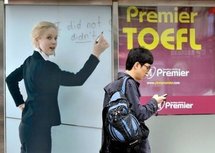South Korea seeks remedy for education fever
Nam You-Sun
SEOUL, Nam You-Sun- After a gruelling six hours of learning at her South Korean state elementary school, eight-year-old Ho You-Jin heads home -- but not to rest.
She picks up a new set of textbooks and sets off for a private cram school, known as a hagwon, to pack in another five or six hours of learning.
"I am used to spending so much time studying, but still I am tired after hagwon and homework," she said.

A foreign language institute in Seoul
Education fever takes a heavy social and economic toll, with the costly private cram schools blamed for driving poor households into debt and stressing out young children.
Parents in the nation of almost 50 million poured 21.6 trillion won (19.4 billion dollars) into private education last year despite the economic downturn, according to government data.
The central bank complained last year the spending was hampering efforts to boost private consumption and economic growth.
President Lee Myung-Bak's government has launched a campaign to curb private education. But some teachers and parents are sceptical, citing what they see as shortcomings in state schools.
"The material taught (in state schools) is way too easy for kids and the kids are not interested in the schoolwork due to a lack of creativity in the teaching," said You-Jin's mother Woo Soon-Young.
"It is impossible to get high scores on difficult tests (just) with public education," Woo told AFP.
You-Jin herself said her state school is no fun. "I don’t learn anything new."
Lee wants to change that, saying students should be able to enter college without depending on private education.
"I worry for South Korea's future if there is no education reform," he said last month after chairing the first monthly meeting dedicated to improving public schools.
He credited the state system with helping to power decades of rapid economic growth but stressed the need for reforms to fit the 21st century environment.
The president has ordered a revamp of the Educational Broadcasting System (EBS) which offers free tuition via television or the Internet. The day after his plan was publicised, downloads of EBS lectures almost doubled.
"We will boost the quality of lectures to attract more students," a spokesman for the service said.
The education ministry wants 70 percent of the questions in the annual College Scholastic Ability Test to be based on EBS material.
"We are trying our best to reduce the private education budget and to absorb private education demands through EBS," education minister Ahn Byong-Man said last month.
The government has ordered hagwon to close by 10.00 pm and gives cash rewards to citizens who report those which flout regulations.
Seoul's education office said this month that 2,600 hagwon in the city -- about nine percent of the total -- have shut down due to the crackdown and the relatively sluggish economy.
But the city government noted last month that each Seoul family still spends an average of 580,000 won (522 dollars) a month on private education, almost 16 percent of income.
Experts say the public's perception, that entry to a top university paves the way for lifetime success, must change.
"We need to get rid of the ‘next door mum effect’. This is when a mother feels insecure over sending her children to fewer hagwon compared to her neighbours," said Kim Dong-Seok, spokesman for the Korean Federation of Teachers’ Associations.
In addition to hagwon, many families send their children to overseas schools or universities to give them a head start in the rat race. Mothers often accompany them.
Fathers known as "wild goose daddies" commute by air from jobs in Korea to see their families overseas.
Some teachers' groups have reservations about the reforms.
"Students must focus on the school curriculum then watch EBS as a supplementary, not the other way around," said Um Min-Young, spokesman for the Korean Teachers and Education Worker’s Union.
"Private education still exists because of lack of satisfaction in (state) school education," Um said. "We must improve the quality of teaching as well as adopt different-level classes for students with different abilities."
-------------------------------------------------------------------------------